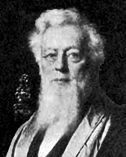Frederick Augustus Porter Barnard was a notable nineteenth-century scientist who made contributions to the fields of mathematics, physics, astronomy, and chemistry and played a leading role in the development of modern higher education as president of Columbia University. Barnard began his teaching career as a tutor at Yale University before taking positions at the University of Alabama and the University of Mississippi. In 1864 he became the tenth president of Columbia University, a position he would hold for twenty-four years. Barnard made significant advances at Columbia, adding new departments, modernizing research, and championing the principle of equal access to education across gender and other divisions. The women’s school, Barnard College, was named for him in order to honor his vision and many contributions to Columbia. He was a founding member of the National Academy of Sciences.



